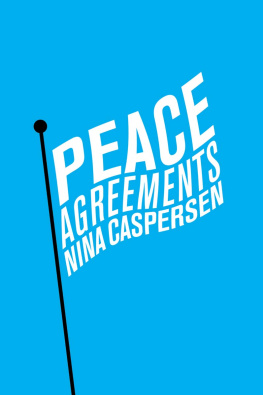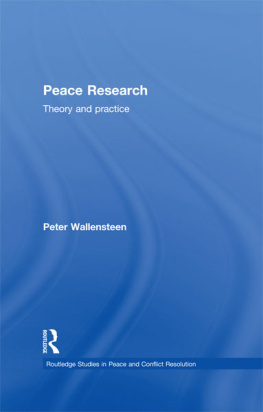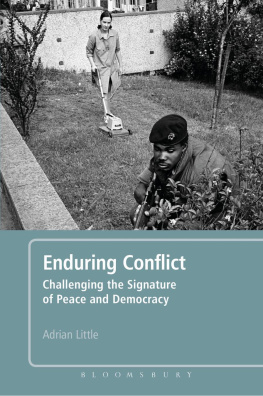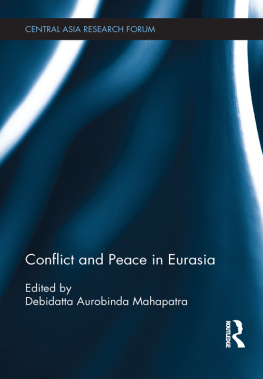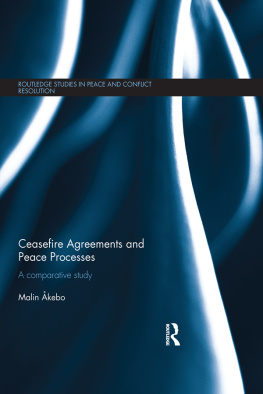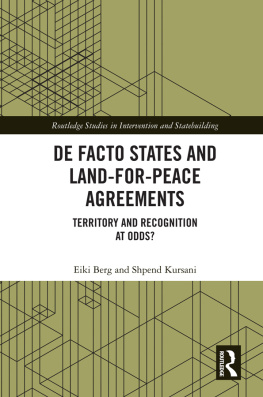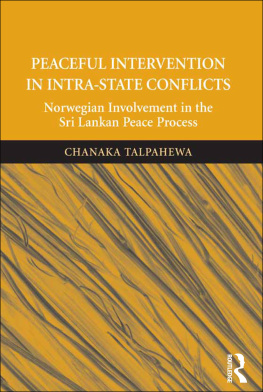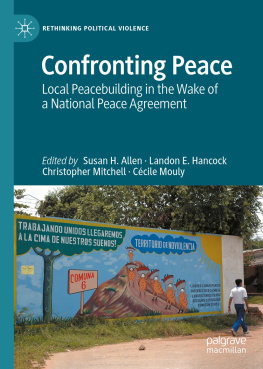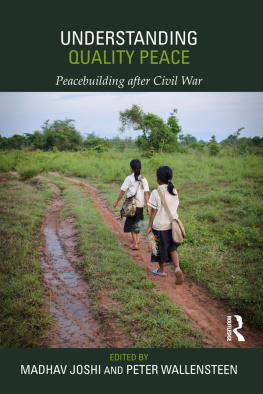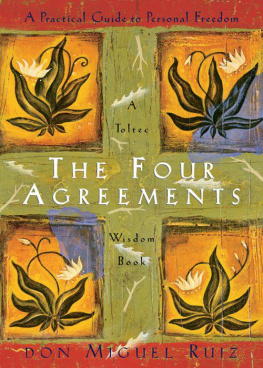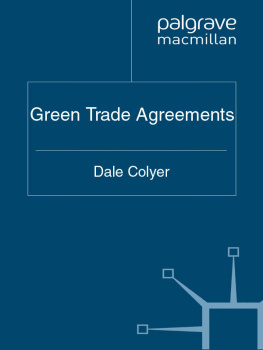Contents
Guide
Pages

To Emma and Sebastian
PEACE AGREEMENTS
FINDING SOLUTIONS TO INTRA-STATE CONFLICTS
NINA CASPERSEN
polity
Copyright Nina Caspersen 2017
The right of Nina Caspersen to be identified as Author of this Work has been asserted in accordance with the UK Copyright, Designs and Patents Act 1988.
First published in 2017 by Polity Press
Polity Press
65 Bridge Street
Cambridge CB2 1UR, UK
Polity Press
350 Main Street
Malden, MA 02148, USA
All rights reserved. Except for the quotation of short passages for the purpose of criticism and review, no part of this publication may be reproduced, stored in a retrieval system, or transmitted, in any form or by any means, electronic, mechanical, photocopying, recording or otherwise, without the prior permission of the publisher.
ISBN-13: 978-1-5095-1569-1
A catalogue record for this book is available from the British Library.
Library of Congress Cataloging-in-Publication Data
Names: Caspersen, Nina, 1976- author.
Title: Peace agreements : finding solutions to intra-state conflicts / Nina Caspersen.
Description: Malden, MA : Polity Press, 2016. | Includes bibliographical references and index.
Identifiers: LCCN 2016020511| ISBN 9780745680262 (hardback : alk. paper) | ISBN 9780745680279 (pbk. : alk. paper) | ISBN 9781509515691 (epub) | ISBN 9781509515684 (Mobi)
Subjects: LCSH: Peace-building. | Self-determination, National. | Autonomy and independence movements. | Partition, Territorial. | Regionalism. | World politics--1989
Classification: LCC JZ5538 .C375 2016 | DDC 303.6/9--dc23 LC record available at https://lccn.loc.gov/2016020511
The publisher has used its best endeavours to ensure that the URLs for external websites referred to in this book are correct and active at the time of going to press. However, the publisher has no responsibility for the websites and can make no guarantee that a site will remain live or that the content is or will remain appropriate.
Every effort has been made to trace all copyright holders, but if any have been inadvertently overlooked the publisher will be pleased to include any necessary credits in any subsequent reprint or edition.
For further information on Polity, visit our website: politybooks.com
ACKNOWLEDGEMENTS
While working on this book I have become indebted to a large number of people. Particular thanks are owed to my colleagues and students in the Department of Politics at the University of York, who provided a stimulating intellectual environment that allowed me to try out some of my initial ideas. The British Academy awarded me a Mid-Career Fellowship which gave me much-needed time for research and writing. I am immensely grateful for this. Polity has been a supportive and patient publisher throughout, and I thank Louise Knight, Nekane Tanaka Galdos and the two anonymous reviewers for their constructive comments which helped me clarify, improve and shorten my arguments. Finally, I thank my beloved partner Keith for enabling me to finish a book with two small children in the house; this is undoubtedly the biggest debt of them all.
ABBREVIATIONS
ABC:Abyei Boundaries Commission (Sudan)AEC:Assistance and Evaluation Commission (Sudan)AMM:Aceh Monitoring Mission (Indonesia)ASEAN:Association of Southeast Asian NationsCHT:Chittagong Hill Tracts (Bangladesh)DDR:Disarmament, demobilization and reintegrationDUP:Democratic Unionist Party (Northern Ireland)ECHR:European Convention of Human RightsECtHR:European Court of Human RightsEU:European UnionGAM:Free Aceh Movement (Indonesia)HDZ:Croatian Democratic Union (Bosnia)ICC:International Criminal CourtICTFY:International Criminal Tribunal for the Former YugoslaviaIDPs:Internally displaced peopleIFOR:The Implementation Force (Bosnia)IGAD:Intergovernmental Authority on DevelopmentINTERFET:International Force for East TimorIRA:Irish Republican ArmyLRA:The Lords Resistance Army (Sudan)LTTE:Tamil Tigers (Sri Lanka)MDFC:Movement of Democratic Forces of Casamance (Senegal)MILF:Moro Islamic Liberation Front (the Philippines)MNLF:Moro National Liberation Front (the Philippines)NCP:National Congress Party (Sudan)OIC:Organization of the Islamic ConferenceOHR:Office of the High Representative (Bosnia)ORA:Organization of the Armed Resistance (Niger)OSCE:Organization for Security and Co-operation in EuropePA:Palestinian Authority (IsraelPalestine)PJCSS:United Peoples Party of the Chittagong Hill Tracts (Bangladesh)PLO:Palestine Liberation Organization (IsraelPalestine)PNG:Papua New GuineaRS:Republika Srpska (Bosnia)SDLP:Social Democratic and Labour Party (Northern Ireland)SPLM/A:Sudanese Peoples Liberation Movement/ArmySSDF:South Sudan Defence ForceSSR:Security sector reformSTV:Single-Transferable Vote (Northern Ireland)UN:United NationsUNITA:National Union for the Total Independence of AngolaUNMIS:United Nations Mission in SudanUNOMB:United Nations Observer Mission in BougainvilleUUP:Ulster Unionist Party (Northern Ireland)
INTRODUCTION
The announcement of a peace agreement is, with good reason, marked as an important breakthrough: former enemies have managed to put their difference aside and agreed to a negotiated settlement. The popular image of such events is of dark-suited men and it is almost always men emerging bleary-eyed from marathon negotiations. The mediators pat them on the back, urging a handshake for the cameras. The public may have been aware that talks were ongoing, but rarely will they have knowledge of what was being discussed. This is only discovered once the agreement is announced. However, interpretations of what has been agreed to often vary wildly, with both sides claiming a victory for their position and hardliners typically denouncing the agreement as a betrayal.
Since the end of the Cold War a significant number of such peace agreements have been reached, including in bloody intra-state conflicts that were previously thought beyond resolution, such as in Bosnia, Northern Ireland, Aceh (Indonesia) and Sudan. Some of these peace agreements have displayed a great deal of ingenuity when it comes to engineering compromises and crafting institutions that address both individual aspirations and collective grievances and fears. Territory has been divided, power has been shared, rights have been guaranteed, and these arrangements have in a number of cases crossed state-borders thus addressing the trans-border nature of many of these conflicts. However, as many if not more peace processes have failed in the same period. Peace talks have been ongoing but compromise solutions are still eluding the mediators. Decades of negotiations have for example failed to bring a solution to the conflicts in Cyprus, GeorgiaAbkhazia and AzerbaijanNagorno Karabakh. The solutions proposed in these cases were often similar to the successful agreements, yet either the specific package of mechanisms put forward did not fully address the dynamics of the conflict, or the timing was just not right.
Reaching an agreement is often a formidable challenge, but the challenges involved in making it work are equally daunting, and many agreements do not last. The Oslo Accords for IsraelPalestine quickly ran into problems and were never fully implemented; the General Peace Agreement for Casamance (Senegal) barely got off the ground; while war broke out again in Mindanao (the Philippines) a few years after the signing of the 1996 peace agreement, and it took until 2014 before a new comprehensive agreement was signed. The settlements for Mali and Crimea (Ukraine) both survived for more than a decade. However, war reignited in Mali in 2012 when rebels proclaimed an Islamic state in the northern part of the country. Russian-backed separatists took control over Crimea in 2014 and Russia subsequently annexed the peninsula.

